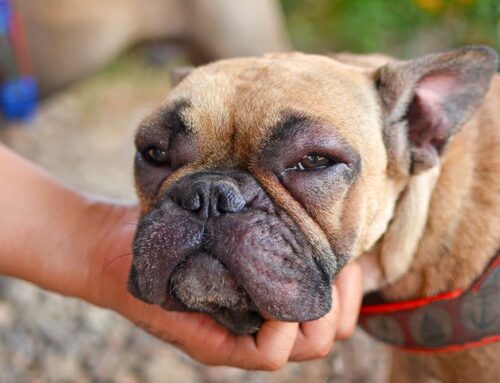If you’ve ever suffered from allergies, you know how miserable they can be. Did you know that your pet can also experience allergic reactions? Like people, cats and dogs can develop allergies to various substances, causing them to feel excessively itchy over their entire body. Allergy season is in full swing for people and pets, and our MountainView Veterinary Hospital team explains what you need to know about pet allergies, including common pet allergens and treatment options.
Allergies that are common in pets
Pets can be allergic to myriad substances. These are the most common allergies pets experience:
- Flea allergies — Fleas aren’t just a nuisance for pets—they can also cause allergic reactions. Some dogs and cats are hypersensitive to a protein in flea saliva, and even a single flea bite can trigger intense itching and discomfort. If your pet is constantly scratching, biting, or licking their skin, fleas could be the culprits. Regular flea preventive administration is essential to keep these pesky parasites at bay and head off allergic reactions.
- Environmental allergies — Like people, pets can be allergic to environmental allergens such as pollen, grasses, mold spores, and dust mites. These allergens can be inhaled or come into contact with your pet’s skin, leading to itching, sneezing, and skin irritation. If your pet seems to suffer more during certain seasons or in specific environments, they may have environmental allergies. Our veterinarian can help identify the specific triggers and recommend strategies to minimize your pet’s allergen exposure.
- Food allergies — Food allergens are also common culprits of allergic reactions in pets. Dogs and cats can develop allergies or intolerances to certain food ingredients such as beef, chicken, dairy, wheat, soy, and corn. Food allergy signs can vary but may include digestive issues, skin problems, and itching. If you suspect your pet has a food allergy, our veterinarian may recommend a hypoallergenic diet trial to identify the trigger ingredients.
- Contact allergies — Some pets are allergic to materials with which they come into contact such as certain fabrics, household cleaners, or grooming products. Contact allergies can cause skin irritation and inflammation, particularly in the skin areas where the allergen has come into direct contact. If you suspect your pet has a contact allergy, try to identify and avoid the offending material. Our veterinarian can recommend hypoallergenic alternatives and topical treatments to soothe your pet’s irritated skin.
- Medication allergies — Although less common, pets can also experience allergic reactions to medications, including antibiotics, vaccines, or topical treatments. Pets’ medication allergy signs may include swelling, hives, difficulty breathing, or vomiting. If you suspect your pet is having an allergic reaction to a medication, stop the medication immediately and contact our veterinarian for further guidance.
Allergy diagnosis in pets
Determining the exact cause of your pet’s allergies can be difficult because they often have more than one trigger. Diagnosing pet allergies typically requires one or more of the following:
- Physical exam — Our veterinarian will often diagnose your pet’s allergies during a physical exam, after ruling out other common skin diseases such as parasites or infections.
- Intradermal testing — The gold standard for diagnosing pet allergies is intradermal testing, which requires sedation and injecting allergens under your pet’s skin. Your pet’s reactions are noted, and your pet’s allergen profile is completed, so you’ll know the substances in your environment that cause an allergy flare.
- Serum testing — Serum testing involves taking a small blood sample from your pet for allergy analysis to measure the allergy antibodies in the blood and determine your pet’s allergens.
- Food trial — During a food trial, which takes about 8 to 12 weeks, your pet receives a hypoallergenic diet that contains no ingredient they have eaten in the past. If the diet trial leads to improvement, ingredients from their previous diet are gradually reintroduced to determine which one causes the sensitivity.
Allergy treatments for pets

Allergies are not curable, but their signs can be managed to relieve itchiness, reduce inflammation, and promote skin healing. Treatment varies depending on the allergy signs’ severity, and may include:
- Anti-itch or anti-inflammatory medications — Medications, such as Apoquel, Cytopoint, prednisone, and Atopica, are useful to stop the itch-scratch inflammatory cycle.
- Antibiotics or antifungals — Secondary infections are common in an allergic pet, which our veterinarian will treat with oral antibiotics or antifungal medications.
- Topical medications — Topical sprays or ointments are especially useful when a pet’s ears are infected or inflamed.
- Medicated shampoos — Shampoos help reduce your pet’s skin inflammation and harmful bacteria. Most allergic pets need medicated baths several times per week when their allergies are at their worst.
- Allergy immunotherapy — Exposing a pet’s immune system to increasing—but controlled—levels of their allergens can result in desensitization over time.
- Hypoallergenic diet — Pets with food allergies may benefit from switching to a hypoallergenic or limited-ingredient diet.
Allergies can make your pet miserable, but relief is possible. If you suspect your pet has allergies, schedule a consultation with our MountainView Veterinary Hospital team.









Leave A Comment